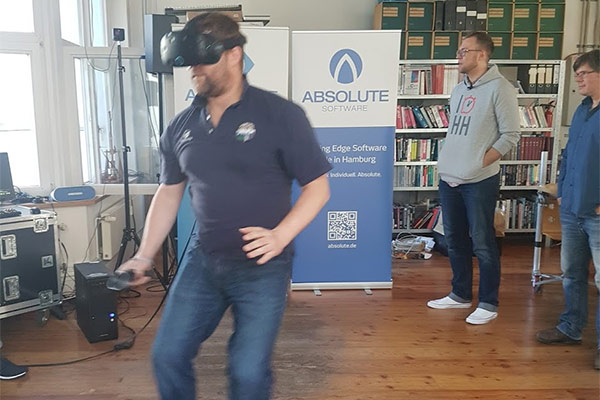Insider Insight
Inside Europe's Oldest Virtual Reality Company
Virtual reality is seeing an explosion of business uses, making waves in everything from architecture to the automotive industry. But it's been a long time coming. Lucy Ingham hears from Germany's Absolute Software about the growth of the technology
Absolute Software's Hamburg office is pretty unassuming for such a pioneering company. Located a stone's throw from the city's waterfront, it's an industrial but stylishly relaxed space on the top floor of a long-converted building.
It is, however, unmistakably the office of a virtual reality company. Aside from the shelves of programming books that line the walls between desks topped with high-end computers, there is the tell-tale empty space in the middle of the room, flanked by discreet sensors, where programmers and visitors can try out Absolute's latest VR projects.
Here Absolute Software has become one of Germany's leading players in B2B virtual and augmented reality projects, producing experiences and software for companies and cities alike, as well playing a key role in the growth of the VR industry within the region.
But while Absolute is certainly making a name for itself now, back when it first started, virtual reality was a very different beast.
Scuba goggles and socialist VR: the birth of virtual reality in Europe
Absolute Software was officially founded in 1995, but the company's roots go back further to the eighties, when founder and managing director Rüdiger Höfert took the first steps to bringing virtual reality to the continent.
"In the 80s we started with 3D stuff, and in the beginning of the 90s, there were a few VR headsets out there that were $15,000," says Höfert.
At this time, virtual reality was largely a concept of science fiction, but such hardware was generating significant excitement among those in the know. Höfert and his contemporaries were keen to get their hands on the technology, but at the time, this wasn't really an option.
"We said 'this is very cool, we want to have something' but unfortunately, we hadn't so much money, so we decided to build our own VR headset," he adds.
“In the beginning of the 90s, there were a few VR headsets out there that were $15,000.”
Instead of crafting something reminiscent of VR headsets today, Höfert and his colleagues adapted a scuba diving mask, using the best components they could afford at the time.
"We bought two Sony monitors with a 320px by 200px resolution and a scuba mask, put some lenses on top of it and then we made a small graphics card and put everything together," he says.
This required importing some of the components from Eastern Germany.
"At this time there was still the wall, so it's lucky socialist VR!" explains Absolute Software 's CDO Oliver Rößling.
The scuba VR headset was mainly a device for experimentation, which Höfert used to make simple experiences for, relying on the slim selection of supporting technology that was then available.
"The performance was not so good as nowadays," explains Höfert. "We made some basic games, because at this time there was the Sony Power Glove, a cheap one for $100, but unfortunately it was very, very slow and not so cool.
"So we put it back and we waited."
Virtual reality goes cold: the VR drought
While Höfert and his contemporaries had caused a stir in Europe with VR, it became clear that virtual reality was simply not mature enough to be a viable focus for a business.
"We stopped in 2000 because at this time everything crashed, then we made a lot of normal e-commerce stuff," says Höfert.
Then in 2012, things changed, when Oculus released its first developer-only headset. Suddenly, VR was becoming viable again, and major technology companies were scrambling to get in on the act.
“We stopped in 2000 because at this time everything crashed, then we made a lot of normal e-commerce stuff.”
Absolute saw this as an opportunity to return to VR, and grabbed it with both hands.
"Then Oculus came out with the first headset so we said 'ok we restart the thing and check if we can do that, because it's very interesting'," says Höfert, adding that it was exciting to return to the technology "because e-commerce is nice but it's not so thrilling".

Höfert, right, and Rößling watch a visitor try a VR demo at the company's Hamburg office
Into the business world: AR and VR come to B2B
While many companies in the virtual and augmented reality space have opted to focus on games and other consumer-focused products, Absolute Software has focused on the B2B sector since its return.
"In Germany it is difficult to make games, because it's too small and there are not enough investors. But business applications work well," he adds.
“In Germany it's difficult to make games, because it's too small and there are not enough investors.”
The company is primarily making experiences for AR device Microsoft HoloLens and the HTC Vive VR headset, two of the leading devices in the field.
"We make some industrial projects, for the harbour, for example, because they have a lot of [data], they want to see their stuff with these devices, with the HoloLens or with VR," Höfert explains.
"And it's very cool for them, because they're planning new buildings, so they can put the buildings in the 3D world, and they can discuss with their guys a lot of use cases for them."
For businesses, the reaction has been positive, particular in the last year, where Absolute has seen a move from muted interest to commitments to projects.
"The AR and VR stuff gets a bit bigger now," he says. "Last year it was 'oh yes, maybe we want to but we don't know', and now the customers are coming here and saying 'now we have business cases, maybe, let's do some stuff'."